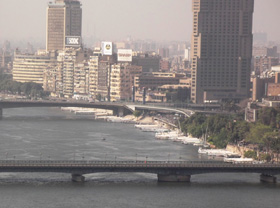A Trini in Egypt - Hope and renewal

By Natalie Williams
Right on cue – with all the symbolism of renewal and rebirth that rolls in with Easter or spring as we know it in the Western world – comes a wave of hope, high expectations and good news across Egypt.
For the first time since the almost back-to-back revolutions, military coup, state of emergency and curfew, there has been a steady enough stream of national developments to pique the interest of expats and locals alike, who all call this vibrant, jubilant, mad, noisy city home.
Egypt’s tourism earnings are up.
Traditionally a big earner for any Egyptian government (the economy still depends heavily on foreign visitors to the Great Pyramids, antiquities and the mighty Nile), tourism had been hard hit by violent uprisings, repeated civil unrest and general instability over the last three years.
And this was so very evident during the holy Easter period for the Wise One and me, “chillin” as we did in the Red Sea resort of El Gouna, which was blissful for all the wrong reasons, on behalf of my beloved Egyptian people.
Keeping spirits up
It was a virtual ghost town, quiet for a change, the hotel under-occupied, restaurants with few patrons, no queuing crowds anywhere, few sailboats heading to the Red Sea islands and only a handful of mega-yacht owners bothering to get out of bed.
For us, it was a much needed rest from the chaos of Cairo and our bustling neighbourhood of Zamalek. Yet the break was tinged with sad feelings for Egypt, as we have come to love our adopted homeland enough to want progress and to care deeply for its economic survival.
On the ground (actually the beach), it was clear that the few Egyptian families who had ventured out of Cairo and the workers at the resort were all trying hard to keep their spirits up, as much for themselves as for the small number of guests that brought them out to earn a living.
It has been an extremely difficult few years for this nation of 90 million Egyptians, who have voted in one government and violently chased out several others in the course of three revolutions.
Tourism earnings up
Back in Cairo, there are still no queues to see the pyramids, nor to sail the Nile on the brightly coloured boats, nor to enjoy the antiquities of Luxor or charming Aswan.
But along with the hope and renewal of all that rolls in with spring, there came some good news.
Despite the challenges, and the spectral feel to Cairo’s major attractions on most days, tourism earnings have increased in the first half of the fiscal year 2014-15 to $4.5bn, according to official figures.
Tourists and their spending power appear to be trickling back to this troubled nation.
This news came on the heels of the Egyptian Tourism Ministry announcing the introduction of, and later abandoning, a new visa regime, which could have seen visitors to Egypt needing to secure visas in their home countries before travelling to Cairo (you normally purchase a visa upon arrival at the airport).
This new visa proposal did not go down well with tour operators, or anyone else for that matter, since they saw it as an “unintelligent move” in these hard times for Egypt and the hard-hit tourism sector. Needless to say, this plan has been shelved.
There’s more good news: Moody’s, the international ratings agency, is also estimating that Egypt’s budget deficit will shrink to 10% of GDP this year, while public debt will decrease to less than 90% of GDP.
And let me tell you – for this international group to use words like “stable” when referring to Egypt is a big deal.
At least for the Egyptian people.
Investment pledges
Then came even bigger news, at least in the eyes of all those watching Egypt’s recovery closely. High-level government ministers, foreign investors, bankers, Arab leaders and Egyptian leaders, all came from far and wide to what was dubbed the Egypt Investment Conference, and they pledged big.
British energy giant BG chipped in $4bn, BP committed $12bn, the Italians pledged $5bn and over the course of the conference, other pledges poured in, with a final figure of $45bn, including sizeable chunks from the Arab world and Egypt.
The diplomats declared that economic reforms were kicking in.
And at this same conference came the latest spectacular announcement from Egypt’s current President, Abdul Fattah al-Sisi: grand plans to build a new capital city.
This vision came complete with an impressive model of the spectacular construction, unveiled for all to see in the Red Sea resort of Sharm el-Sheikh.
Our Egyptian friends were lukewarm, likening the project to a previous president’s grand ideas. “Wait and see,” they tell us in Arabic.
A nation in flux
Life on the ground is in fact changing, although after nearly two years living here, I can’t categorically say it’s for the better. Egypt is a nation in flux.
Without a doubt, there are lingering and very troubling lifestyle issues. Two recent explosions were far too close to home for comfort.
A nearby bridge linking our neighbourhood of Zamalek Island with the rest of Cairo and Giza, where the pyramids are located, was bombed with a home-made device that killed three people, including a police officer.
Everyone was quick to point out that attacks against Zamalek Island are rare, and there is some comfort to be taken from this.
However, attacks against police officers and security forces have increased since the 2013 military ousting of former president Mohammed Morsi, and I admit it feels a little dicey to walk past my local police station – a regular route when I explore the local cafes, shops and art galleries.
Since the national demonstrations that left hundreds dead, the Muslim Brotherhood, once the strongest political grouping in Egypt, has been declared a terrorist group, which its millions of supporters deny.
So personal security awareness is still paramount.
And as the climate warms up across these ancient lands, there is a general sense of hope that the billion-dollar projects promised by the current Egyptian regime will finally usher in the stability and higher standard of living that millions here want.


